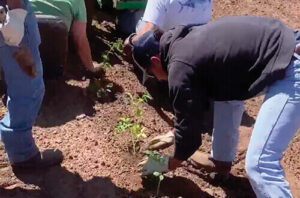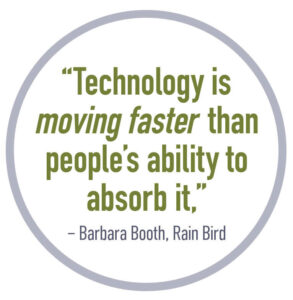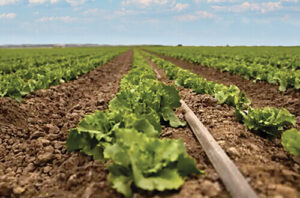
In fall of 2021, the Irrigation Association, Fairfax, Virginia, and the Irrigation Innovation Consortium, Fort Collins, Colorado, collaborated to ask irrigation sector representatives to identify the kinds of research, information and other efforts they’d like to see supporting irrigation technology advancement and adoption. Questions for this “Irrigation Industry Survey and Needs Assessment” were emailed to the IA’s membership list.
A total of 414 people completed the survey. As a group, respondents self-identified as being manufacturers, dealers, distributors, tech startups, trade organizations, software developers, consultants, “on-farm,” government and utilities, landscape contractors, or educators. Industry consultant Inge Bisconer, CID, CLIA, led the IIC in conducting 20 follow-up interviews with a diverse group of irrigation sector representatives.

This study serves as an example of mutual efforts that the IA and IIC intend to work on in months ahead to support the irrigation industry, promote the benefits of efficient irrigation and advance irrigation management. During the Irrigation Show and Education Week, outgoing IA CEO Deborah Hamlin, CAE, FASAE, and IIC Executive Director Timothy Martin, PhD, signed a memorandum of understanding to formally recognize this shared commitment.
IIC is using the industry survey findings to guide its research and program priorities for 2022 and beyond. IIC will deliver clear value to irrigation industry partners through the research it supports and ensure that these projects will support irrigators and communities in effectively addressing management goals and challenges.
 The survey and interviews revealed significant interest in supporting projects that will clarify the potential benefits of various precision and advanced irrigation tools and methods, including quantifying water, nutrient, energy and labor savings in different regions that can be achieved through the use and integration of irrigation management tools and strategies.
The survey and interviews revealed significant interest in supporting projects that will clarify the potential benefits of various precision and advanced irrigation tools and methods, including quantifying water, nutrient, energy and labor savings in different regions that can be achieved through the use and integration of irrigation management tools and strategies.
In addition, the responses indicate a consensus view that more training and workforce development for irrigators, water managers, irrigation system dealers, technology service providers and others is needed. “Technology is moving faster than people’s ability to absorb it,” noted Barbara Booth, vice president for microirrigation at Rain Bird.
According to the study, another need is more investment in educational programming and the establishment of curricula standards for advanced and precision irrigation management, to close the adoption gap and improve management outcomes.
“The bottom line is that there’s not enough of us to do the time-consuming work of training one-on-one,” noted Jim Anshutz in his interview for the project. Anshutz is founder and owner of Fresno-based company AG/H2O, which offers producers technological solutions to measure and control rising costs of water, energy and nutrients in their operations. “Educational standards and protocols [enable] you to teach to a higher level, based on those standards,” said Anshutz.

Additional areas of interest highlighted by the study included partnering with universities to vet and beta test newer tools and bringing diverse partners together to develop or improve decision support systems to integrate and derive more value from real-time data streams.
Most survey respondents (68%) and all 20 interviewees noted that establishing benchmarks for irrigation’s water and energy footprint is very important, both for agriculture and landscape contexts. Benchmarks are needed to assess if and how irrigation management is improving or could improve to reduce the footprints.
While proprietary concerns regarding innovation in irrigation technology remain within the industry, there was interest among survey respondents in collaborative research. A few of the benefits of collaboration listed in the report include validating practices and sustainability levels; market research to benchmark adoption rates; and validating, demonstrating and identifying ways to refine new products before and after launch. Furthermore, there is an interest among survey respondents to collaborate to learn more about resource sustainability and renewable energy sources.

One of the most encouraging findings was that industry respondents and interviewees are interested in partnering with IIC. “There’s nothing else like IIC going on anywhere, globally, with the kinds of partners you can pull together and the work you can take on,” stated John Farner, Netafim chief sustainability officer. “I think this is both a great and necessary initiative.”
IIC is well positioned to facilitate collaborative efforts on many of these research areas and other topics covered through the survey and interviews.
In early 2022, IIC launched a new call for research pre-proposals for collaborative projects involving public and private partners. More information on this call is available at irrigationinnovation.org/2022rfp.
IIC’s mission is to advance the development and adoption of water-efficient tools, technologies and practices used in agricultural and landscape irrigation. To achieve this mission, IIC connects industry and academic partners to leverage their expertise and speed the transfer of new and useful knowledge across the irrigation sector. The IIC is supported by a $5 million contribution commitment from the Foundation for Food and Agriculture Research. IIC project partners provide matching support for an overall investment of at least $10 million over five years. Since its founding in 2018, IIC has helped fund more than 30 research projects in eight states involving more than 45 private companies and public entities as collaborative partners.
8280 Willow Oaks Corporate Drive | Suite 630 | Fairfax, VA 22031
Tel: 703.536.7080 | Fax: 703.536.7019
HOME | ABOUT US | ADVERTISE | SUBSCRIBE | CONTACT | PRIVACY POLICY | IA ANTITRUST STATEMENT